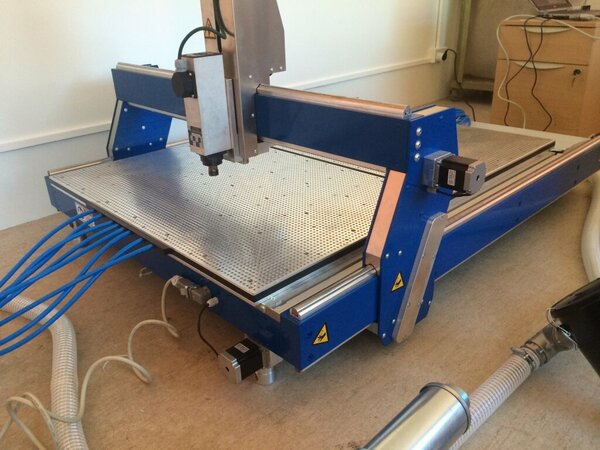ALL BUSINESS
COMIDA
DIRECTORIES
ENTERTAINMENT
FINER THINGS
FREE CREATOR TOOLS
HEALTH
MARKETPLACE
MEMBER's ONLY
MONEY MATTER$
MOTIVATIONAL
NEWS & WEATHER
TECHNOLOGIA
TV NETWORKS
VIDEOS
VOTE USA 2026/2028
INVESTOR RELATIONS
ALL BUSINESS
COMIDA
DIRECTORIES
ENTERTAINMENT
FINER THINGS
FREE CREATOR TOOLS
HEALTH
MARKETPLACE
MEMBER's ONLY
MONEY MATTER$
MOTIVATIONAL
NEWS & WEATHER
TECHNOLOGIA
TV NETWORKS
VIDEOS
VOTE USA 2026/2028
INVESTOR RELATIONS
Posted by - mayuri kathade -
on - Thu at 12:12 PM -
Filed in - Business -
41 Views - 0 Comments - 0 Likes - 0 Reviews

How CNC Routers Are Revolutionizing the Automation & Equipment Industry
In recent years, Computer Numerical Control (CNC) routers have significantly impacted the automation and equipment industry, transforming how manufacturers, engineers, and designers approach precision machining. These powerful machines have revolutionized various industrial processes by improving efficiency, precision, and versatility.
As industries continue to embrace automation, CNC routers are becoming indispensable tools for businesses looking to enhance productivity and stay competitive in a fast-evolving market.
One of the most notable advantages of CNC routers is their unparalleled precision. Traditional machining methods often rely on manual control, which introduces the risk of human error. However, CNC routers operate with computer-controlled guidance, allowing for precise, repeatable cuts with minimal variation. Whether working with wood, metal, plastics, or composites, CNC routers can achieve accuracy levels that are difficult to match with conventional equipment.
This precision is particularly valuable in industries such as aerospace, automotive, and medical device manufacturing, where even the slightest deviation can lead to critical flaws in the final product.
According to a CNC routers Market report, the industry is expected to grow significantly in the coming years.
CNC routers have significantly boosted efficiency in manufacturing processes. Unlike manual machining, which requires constant human supervision, CNC routers can operate autonomously once programmed. This ability enables manufacturers to maximize production with minimal labor costs and reduced downtime. Additionally, CNC routers can handle complex designs and intricate patterns that would otherwise be time-consuming and challenging to execute manually. The automation of repetitive tasks also frees up skilled labor for more strategic and creative work, further enhancing overall productivity.
Another way CNC routers are revolutionizing the industry is through their ability to process a wide range of materials. From softwoods and hardwoods to metals, plastics, foams, and composites, CNC routers can handle diverse materials with ease. This versatility makes them an essential tool for various industries, including furniture manufacturing, signage production, prototyping, and mold-making. By adjusting cutting speeds, tool types, and operational settings, manufacturers can optimize CNC routers for different materials, ensuring efficient and high-quality outputs.
Traditional machining processes often generate significant material waste due to manual errors and inefficiencies. CNC routers, however, are programmed for optimal material utilization, reducing waste and minimizing costs. With their ability to make precise cuts and minimize excess material removal, these machines contribute to sustainability by lowering resource consumption. Additionally, CNC routers reduce the need for multiple machines and labor-intensive setups, further cutting operational expenses. In the long run, businesses can achieve higher profit margins by maximizing resource efficiency while maintaining superior product quality.
The integration of CNC routers with Computer-Aided Design (CAD) and Computer-Aided Manufacturing (CAM) software has taken automation to the next level. Designers can create intricate 2D and 3D models, which are then translated into machine instructions using CAM software. This seamless transition from design to production ensures accuracy and consistency while reducing the time required for prototyping and mass production. The ability to quickly modify designs and program new projects enhances adaptability, enabling manufacturers to respond swiftly to changing market demands.
In the modern manufacturing landscape, customization is key to meeting consumer demands. CNC routers provide manufacturers with the flexibility to produce custom components and one-off designs without compromising efficiency. Whether it’s personalized signage, intricate engraving, or custom furniture pieces, CNC routers can achieve high levels of detail and customization. At the same time, they also facilitate mass production by enabling rapid replication of complex parts with consistent quality. This dual capability makes CNC routers invaluable for industries requiring both mass production and bespoke manufacturing solutions.
Workplace safety is a critical concern in the manufacturing sector. Traditional machining techniques often involve manual handling of cutting tools, increasing the risk of workplace injuries. CNC routers enhance safety by automating cutting and shaping processes, reducing direct human interaction with sharp tools and moving parts. Operators can control CNC routers from a safe distance, minimizing the chances of accidents. Furthermore, the reduction in manual labor intensity means that workers can focus on monitoring and programming rather than physically engaging in strenuous machining tasks.
CNC routers have not only transformed large-scale manufacturing but have also empowered small businesses and home-based enterprises. Compact and affordable desktop CNC routers have made it possible for small-scale manufacturers, hobbyists, and entrepreneurs to create high-quality products without heavy investment in traditional machinery. This democratization of manufacturing technology allows individuals to turn creative ideas into marketable products, fostering innovation and entrepreneurship.
As technology continues to evolve, CNC routers are expected to become even more advanced. Developments in artificial intelligence (AI) and machine learning are likely to enhance automation, making CNC routers smarter and more adaptive to complex tasks. Additionally, advancements in multi-axis machining and hybrid manufacturing (combining CNC with additive manufacturing techniques) will further expand their capabilities. The increasing adoption of the Internet of Things (IoT) in manufacturing will also enable real-time monitoring and predictive maintenance, ensuring seamless operations and minimal downtime.
CNC routers have undeniably revolutionized the automation and equipment industry by enhancing precision, efficiency, versatility, and cost-effectiveness. Their integration with CAD/CAM software, ability to process diverse materials, and automation of repetitive tasks have made them indispensable tools in modern manufacturing. As industries continue to embrace automation and technological advancements, CNC routers will remain at the forefront of innovation, shaping the future of manufacturing and industrial production. Whether in large-scale factories or small workshops, these powerful machines are driving efficiency, customization, and safety, ultimately redefining the possibilities of automated manufacturing.


